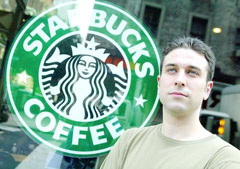From the New York Times - (National Labor Relations) Board Accuses Starbucks of Trying to Block Union
Submitted on Tue, 04/03/2007 - 5:42pm
 By Steven Greenhouse - New York Times, April 3, 2007
By Steven Greenhouse - New York Times, April 3, 2007
The National Labor Relations Board has accused Starbucks of breaking the law 30 times in fighting union activity at four of its coffee shops in Manhattan.
The labor board’s regional office in Manhattan issued detailed charges against Starbucks on Friday after organizers from the [Industrial] Workers of the World complained that the company had sought to suppress their efforts to form a union.
In its complaint, the labor board said that Starbucks managers at the four locations had retaliated against workers supportive of unionizing by firing two of them, threatening to terminate others and giving several workers negative performance evaluations.
The labor board also accused Starbucks management of illegally interrogating workers about their support of a union and prohibiting workers from discussing the union while on breaks.
Valerie O’Neil, a spokeswoman for Starbucks said, “We believe the allegations are baseless, and we will vigorously defend ourselves.”
In one of the charges, the labor board said that Starbucks managers had discriminated improperly against pro-union workers in enforcing the company’s dress and jewelry policy.
The labor board accused a total of 11 supervisors of engaging in illegal activities at four Starbucks: 10 Union Square East, 116 East 57th Street, 200 Madison Avenue and 145 Second Avenue.
Daniel Gross, one of the union’s main organizers and one of the Starbucks workers the labor board said was fired improperly, said the [Industrial] Workers of the World was pushing for a living wage, asserting that the $8.75 an hour that some Manhattan coffee clerks, or baristas, earn was too little to live on.
Mr. Gross said the union wanted Starbucks to change its scheduling policy in order to guarantee a minimum of 25 or 30 hours of work a week for many of its employees.
“The N.L.R.B.’s complaint illustrates that this is a company with a profound disrespect for workers’ rights,” said Mr. Gross, who had worked as a Starbucks barista for three years until he was fired last August. “Any idea that this was just a few bad apples is belied by the fact that the N.L.R.B. accused more than 10 Starbucks officials of illegal activities.”
Starbucks, which is based in Seattle, has long portrayed itself as a model employer, noting that it was one of the first employers in the United States to offer comprehensive health benefits to part-time employees. Moreover, the company boasts that it gives stock options to many of its “partners,” the term it uses to describe its employees.
Under labor board procedures, an administrative law judge is to hold a trial to determine whether Starbucks is guilty of the unfair labor practices.
In case of a guilty verdict, Starbucks might be required to reinstate the two fired employees and to post a notice that it would not engage in illegal, anti-union activities.
Thirteen months ago, Starbucks reached a settlement with the [Industrial] Workers of the World, agreeing to offer jobs back to two workers and to pay nearly $2,000 to several employees after the labor board brought a separate set of charges against the company, accusing it of illegally seeking to quash efforts to unionize.